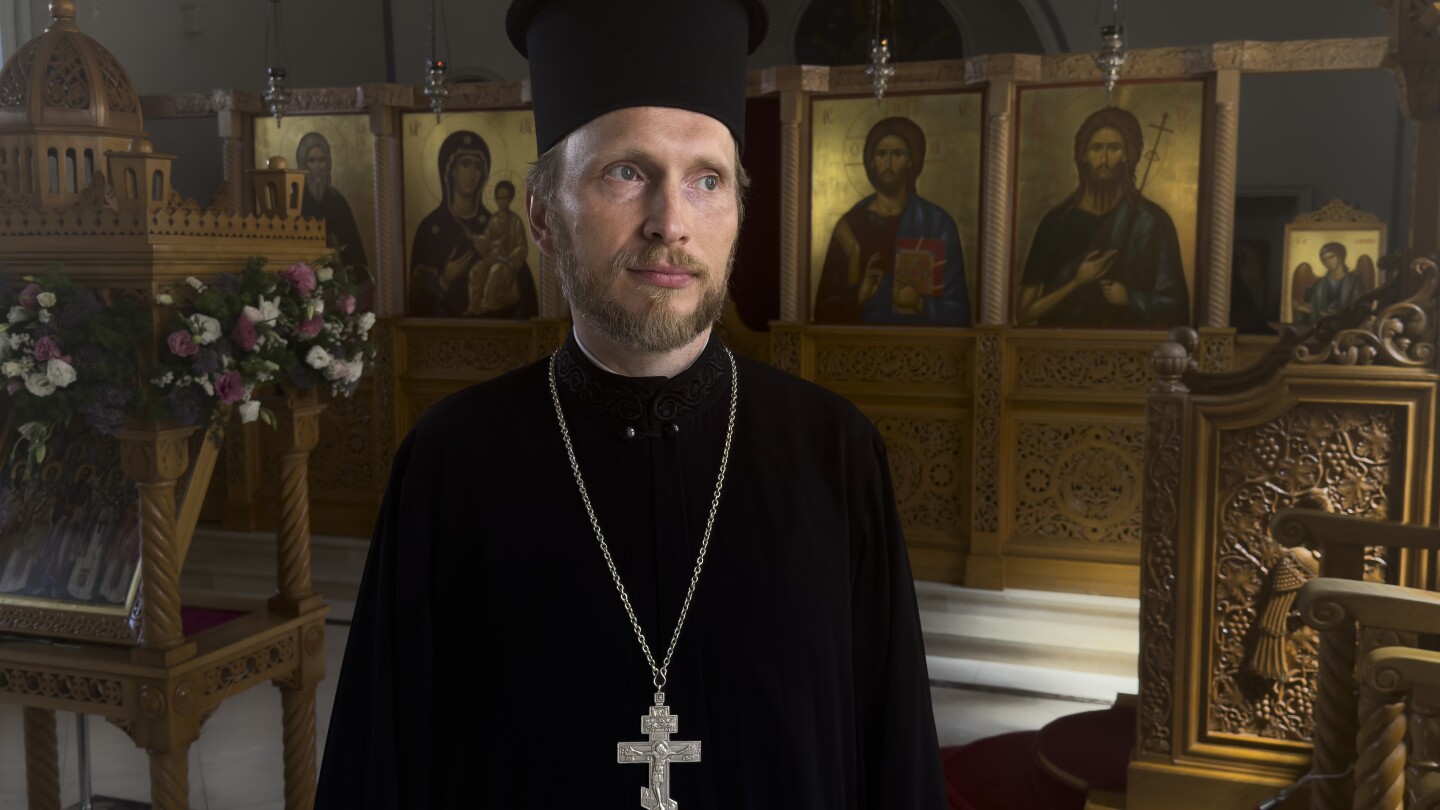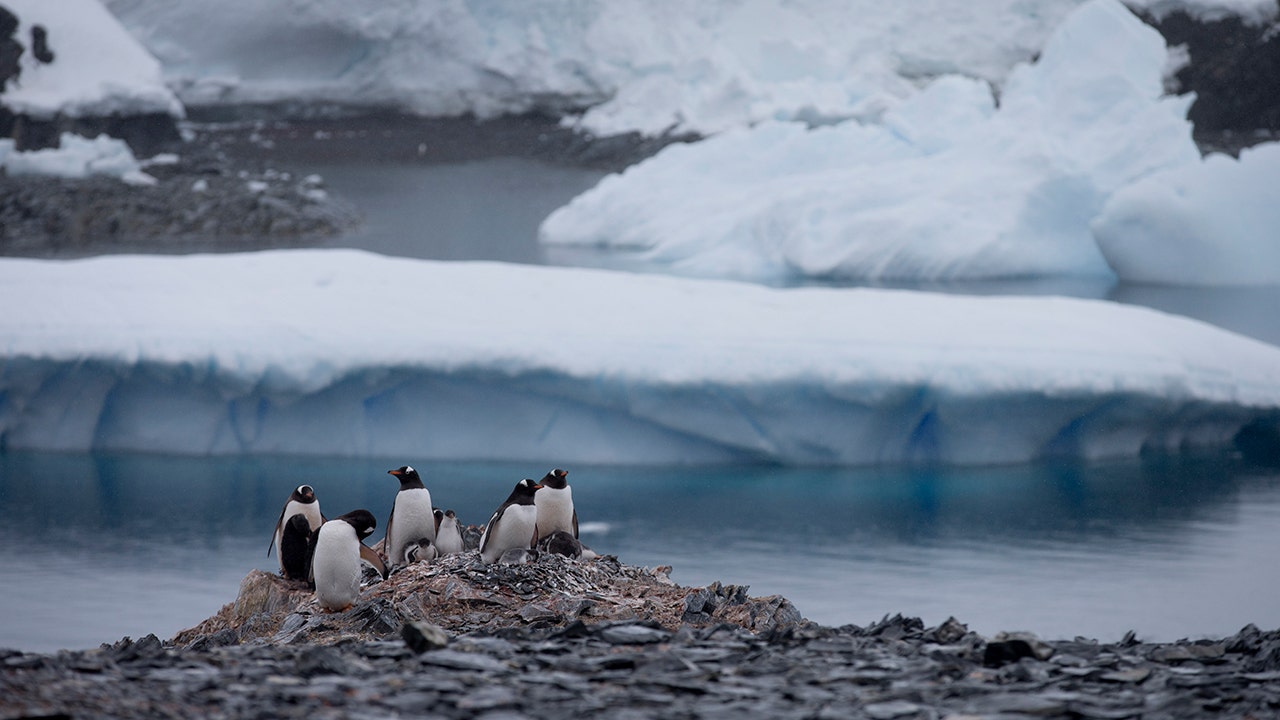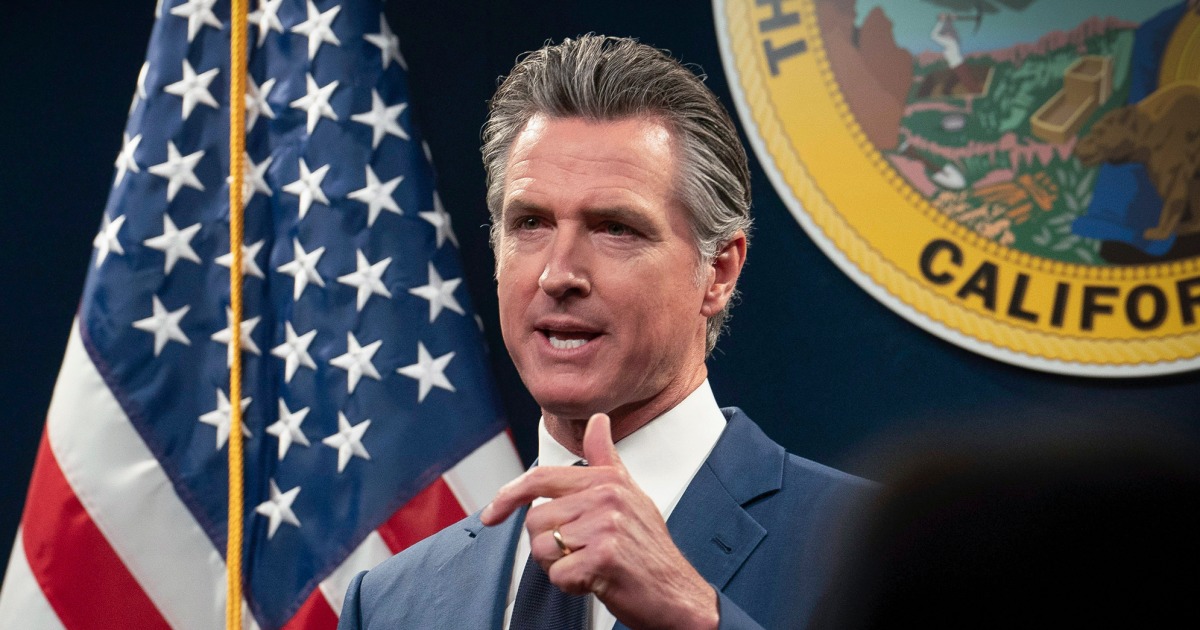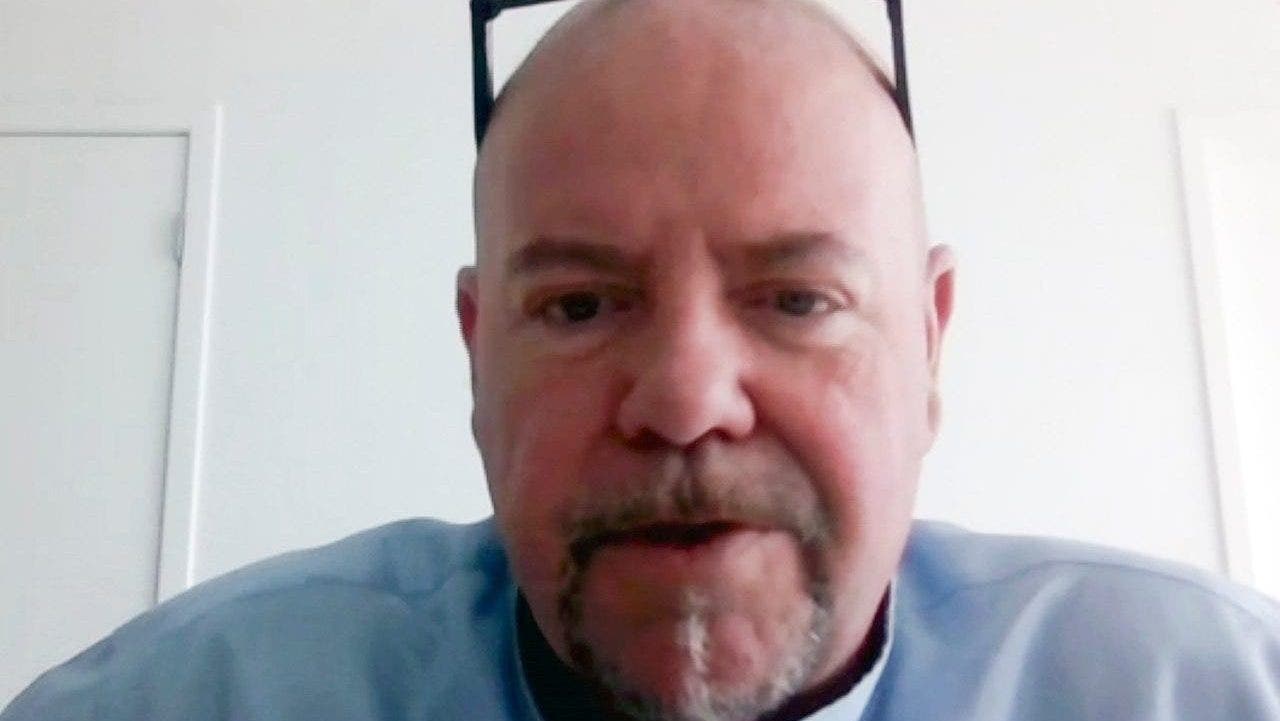World
Russian Orthodox priests face persecution from state and church for supporting peace in Ukraine

ANTALYA, Turkey (AP) — Standing in an old Orthodox church in Antalya with a Bible in one hand and a candle in the other, the Rev. Ioann Koval led one of his first services in Turkey after Russian Orthodox Church leadership decided to defrock him following his prayer for peace in Ukraine.
Last September, when President Vladimir Putin ordered a partial mobilization of reservists, Moscow Patriarch Kirill required his clergymen to pray for victory. Standing in front of the altar and dozens of his parishioners in one of Moscow’s churches, Koval decided to put the peace above the patriarch’s orders.
“With the word ‘victory’ the prayer acquired a propagandistic meaning, shaping the correct thinking among the parishioners, among the clergy, what they should think about and how they should see these hostilities,” Koval said. “It went against my conscience. I couldn’t submit to this political pressure from the hierarchy.”
In the prayer he recited multiple times, the 45-year-old priest changed just one word, replacing “victory” with “peace” — but it was enough for the church court to remove his priestly rank.
Publicly praying or calling for peace also poses risks of prosecution from the Russian state. Shortly after Russian troops invaded Ukraine, lawmakers passed legislation that allowed prosecuting thousands of people for “discrediting the Russian army,” a charge that in reality applies to anything that contradicts the official narrative, be it a commentary on social networks or a prayer in church.
Similar to Putin’s authoritarian regime, Kirill built a harsh hierarchy in the church that demands total conformity, Andrey Desnitsky, professor of philology at Vilnius University in Lithuania, told The Associated Press. If a priest refuses to read the patriarch’s prayer, his loyalty is suspect.
“If you are not loyal, then there is no place for you in church,” added Desnitsky, a longtime expert on the Russian church.
When the war started, most priests remained silent, fearing pressure from the church and state authorities; only a small fraction have spoken out. Of more than 40,000 clergymen in the Russian Orthodox Church, only 300 priests signed a public letter calling for peace in Ukraine.
But each of the public voices against the war is crucial, said Natallia Vasilevich, the coordinator for the human rights group Christians Against War.
“It breaks what seems to be a monolithic position of the Russian Orthodox Church,” she told AP.
Since the beginning of the war, Vasilevich’s team has counted at least 30 Orthodox priests who faced pressure by religious or state authorities. But there might be even more cases, she says, as some priests are afraid to talk about repressions, fearing it will bring more.
The Russian Orthodox Church explains the repressions against the priests who spoke against the war are punishment for their so-called engagement in politics.
“The clergy who turn themselves from priests into political agitators and persons participating in the political struggle, they, obviously, cease to fulfill their pastoral duty and are subject to canonical bans,” Vakhtang Kipshidze, the deputy head of the church’s press service, told AP.
At the same time, the priests who publicly support the war in Ukraine do not face any repercussions and moreover are supported by the state, Vasilevich said.
“The Russian regime is interested in making these voices sound louder,” she added.
The priests who refuse to join this chorus or stay quiet can be reassigned, temporarily relieved of their duties, or defrocked — losing their salary, housing, benefits, and most importantly their ministries to their flock.
“I never questioned the choice I made,” Koval said. “I, my whole soul, my whole being opposed this war. It was impossible for me to support the invasion of Russian troops into Ukraine with my prayer.”
After a Russian Orthodox Church court decided he should be defrocked, Koval appealed to Ecumenical Patriarch Bartholomew of Constantinople, who has asserted a right to receive petitions of appeal from other Orthodox churches’ clergy, over Russia’s objections.
In June, the Constantinople patriarchate decided that Koval was punished for his stance on the war in Ukraine and ruled to restore his holy rank. The same day, Bartholomew allowed him to serve in his churches.
The Rev. Ioann Burdin also wanted to leave the Russian Orthodox Church after he spoke out against the war at a small church near Kostroma and the local court fined him for discrediting the Russian army. He asked the patriarch to approve his transfer to the Bulgarian Orthodox Church but instead, Kirill banned him from service until the priest made a public apology.
“My position, which I first stated on the website, then in the church, and later during the trial was an expression of my religious convictions,” the priest told AP. “Since all people are brothers, then any war, any military conflict, one way or another becomes fratricidal.”
Not allowed to serve in the church, Burdin brought his sermons to a Telegram channel where he guides Orthodox Christians confused by the patriarch’s support of the war.
During his more than two decades in power, Putin has massively boosted the Russian Orthodox Church’s standing, increasing its prestige, wealth and power in society after decades of oppression or indifference under Soviet leaders.
In turn, its leaders, like Patriarch Kirill, have supported his initiatives. The church has thrown its weight behind the war in Ukraine and it has been commonplace to see its clergymen blessing troops and equipment heading into battle and invoking God’s blessings in the campaign.
The Rev. Iakov Vorontsov, a priest in Kazakhstan, was shocked and desperate when he first heard the news of the war. He was hoping the church would step in to mediate the conflict. But neither his peers nor his superiors supported his calls to preach peace.
“I realized that no one hears the words about peace,” the 37-year-old priest says. “It should have been conveyed to the people, to our flock, but it was not. And then I realized that I have another tool: social networks.”
While his anti-war posts on Facebook received support online, the offline reaction was hostile. His superiors reassigned him several times, forbade him from giving sermons, and told parishioners to stay away from him. In the end, the priest lost hope and decided to temporarily stop serving in the Russian Orthodox Church.
“They wanted me to leave, and in the end, they got it,” the priest says, sitting in his apartment without a black robe that he wore for the past 13 years. “But I didn’t renounce my rank, I just decided for the time being that I can’t be among these people in this situation.”
The patriarch’s influence goes far beyond the boundaries of his country and his orders apply even to priests serving abroad. In February, Kirill suspended for three months the Rev. Andrei Kordochkin, a priest at an Orthodox church in Madrid, for his anti-war stance.
Kipshidze said Kordochkin was punished for “inciting hatred” among his parishioners. But the priest says it’s a warning to dissuade him from further criticism.
“I don’t think that there is something that I have done wrong canonically,” Kordochkin said. “If there is no canonical crime, then it means that canon law is simply used as a mechanism of political repression.”
Since the first days of the war, Kordochkin has publicly condemned the Russian invasion and has been regularly praying for peace in Ukraine. He believes priests should not remain silent and must convey a Christian message to people.
“We have a duty to speak out, whatever the cost of that will be.”
___
Associated Press journalists Iain Sullivan in Madrid and Vladimir Tretyakov in Almaty, Kazakhstan, contributed.
___
Associated Press religion coverage receives support through the AP’s collaboration with The Conversation US, with funding from Lilly Endowment Inc. The AP is solely responsible for this content.

World
Wheel of Fortune Contestant Stuns Pat Sajak With NSFW Answer — Watch

ad
World
In message to Russia, Chilean lawmakers meet in Antarctica to underline territorial claims

Defense officials from Chile convened a meeting at the bottom of the planet on Thursday in a bid to bolster their territorial claims in Antarctica as tensions escalate over Russia’s maneuvers in the polar region.
Lawmakers from Chile’s parliamentary defense committee flew to a desolate air base for a meeting billed as an assertion of national sovereignty.
AN UNUSUAL AUTUMN FREEZE GRIPS PARTS OF SOUTH AMERICA, GIVING CHILE ITS COLDEST MAY IN 74 YEARS
“We are going to be sitting in Antarctica in an act of sovereignty, of safeguarding and supporting our national integrity in the face of any threats,” said committee member Camila Flores, singling out Russia as posing such a threat.
Gentoo penguins stand on rocks near the Chilean station Bernardo O’Higgins, Antarctica, Jan. 22, 2015. Members of Chile’s Defense Committee met on Thursday, May 23, 2024, in a special briefing in the Antarctic to address “the prevailing geopolitical conditions”. (AP Photo/Natacha Pisarenko)
The lawmakers revealed little about their talks at the glacier-filled base beyond saying they addressed “the prevailing geopolitical conditions” on the white continent that has vast mineral resources, fresh water reserves and no government.
The meeting comes amid a recent frenzy of media reports surrounding Russia’s purported discovery of massive oil reserves in Antarctica back in 2020, when the Russian polar research vessel Alexander Karpinsky reportedly uncovered some 500 billion barrels worth of crude oil. The issue resurfaced earlier this month in a U.K. parliamentary session where experts warned Russia’s geological surveys could jeopardize the decades-long ban on mining in the region.
The reports rattled Chile and Argentina — among the seven countries that assert claims of sovereignty over parts of the demilitarized continent. Russia’s surveys took place in the Weddell Sea, where Chile’s territorial claims overlap with those of Britain and Argentina, according to documents presented to the British parliament.
“We are going to continue defending what we believe is fair,” said Francisco Undurraga, head of Chile’s defense committee, condemning the “crafty aspirations” of nations rushing to assert greater influence over Antarctica in an increasingly energy-hungry world.
When reports of Russian resource-extraction projects surfaced earlier this month, Argentina demanded to know whether Russia had scientific or economic intentions. Chilean President Gabriel Boric promised to “firmly oppose any commercial exploitation of minerals and hydrocarbons.”
Historic tensions over Antarctic claims have also re-emerged between Boric’s left-wing government and Argentina’s far-right government.
In an effort to reshape Argentina’s foreign policy in line with the United States, Argentine President Javier Milei last month announced the construction of a southern naval base with U.S. involvement to help Argentina stake claim to Antarctica, drawing complaints from Chile’s foreign ministry.
Geopolitical competition is just the latest issue to test the 53-nation Antarctic Treaty, which in 1959 enshrined the territory as a scientific preserve used only for peaceful purposes.
Rising sea levels due to climate change, unregulated tourism and krill fishing in the Southern Ocean are just a few other challenges that the consensus-based system is struggling to address.
World
Russia-Ukraine war: List of key events, day 819

As the war enters its 819th day, these are the main developments.
Here is the situation on Friday, May 24, 2024.
Fighting
- At least seven people were killed and dozens more injured in a Russian missile attack on Kharkiv, Ukraine’s second-largest city and home to about one million people.
- Nearly 11,000 people have been forced to leave their homes in the Kharkiv region since Russian forces began a cross-border ground offensive there on May 10, Governor Oleh Syniehubov said.
- Vyacheslav Gladkov, the governor of Russia’s Belgorod region, said one woman was killed after a destroyed Ukrainian drone fell on her house. The Russian Ministry of Defence said 35 Ukrainian rockets and three drones had been shot down over the Belgorod region, which lies across the border from Kharkiv.
- Russia’s Defence Ministry claimed its forces had recaptured the small village of Andriivka in Ukraine’s eastern Donetsk region. The Ukrainian General Staff said later that its troops were repelling three Russian assaults in the area of Andriivka and nearby Novyi. Andriivka was liberated by Ukrainian soldiers in an offensive last September.
- Sergei Aksyonov, the head of the Russia-annexed Crimea peninsula, said two people were killed in a Ukrainian missile attack near Simferopol, the peninsula’s main administrative centre. Ukraine has not commented on the alleged attack. Russia invaded and annexed Crimea from Ukraine in 2014.
- Russia said it brought down a Ukrainian drone in its central Tatarstan region, hundreds of kilometres from the two countries’ border.
Politics and diplomacy
- Russia arrested Lieutenant-General Vadim Shamarin, deputy head of Russia’s General Staff, and a high-ranking defence official on corruption and “abuse of power” charges in a widening crackdown on corruption in military contracts. The two are being held in custody pending trial.
- Russian President Vladimir Putin arrived in Belarus, Moscow’s closest ally, for talks with President Alexander Lukashenko that are expected to focus on security and military exercises involving tactical nuclear weapons.
- Putin signed a decree allowing the confiscation of assets inside Russia belonging to the United States, its citizens and companies, to use as compensation over Western sanctions against Moscow.
- Russia jailed 36-year-old barman Vladimir Malina for 25 years for joining a unit of Russians fighting for Ukraine and carrying out sabotage of railway equipment.
- Russia jailed 20-year-old student Vladimir Belkovich, from Siberia’s Irkutsk region, to 13 years in prison for treason after he agreed to post leaflets on behalf of a pro-Ukraine partisan group.
- Thirteen Ukrainian children returned home from Russia and Russian-occupied territories of Ukraine with the cooperation of Qatar, officials in Kyiv said. Ukraine says about 20,000 Ukrainian children have been sent to Russia without the consent of their families or guardians.
- OVD-Info, a leading Russian rights group and protest monitoring network, said it had received a notice from YouTube threatening to block access in Russia to one of its video channels featuring news on the war in Ukraine.
Weapons
- Ukraine’s Foreign Minister Dmytro Kuleba again called on the country’s Western allies to send seven Patriot air defence systems. “They are needed now, not tomorrow,” he said.
- The US is preparing a new $275m military aid package for Ukraine, which will include high mobility artillery rocket systems (HIMARS), as well as 155mm and 105mm high-demand artillery rounds, Javelin and AT-4 antitank systems, antitank mines, tactical vehicles and small arms.
- Russian jamming has prevented many of Ukraine’s relatively new long-range glide bombs from hitting their intended targets, Reuters reported, citing three people familiar with the challenges.
-

 World1 week ago
World1 week agoPro-Palestinian university students in the Netherlands uphold protest
-

 Politics1 week ago
Politics1 week agoDem newcomer aims for history with primary win over wealthy controversial congressman
-

 Politics1 week ago
Politics1 week agoSouthern border migrant encounters decrease slightly but gotaways still surge under Biden
-

 World1 week ago
World1 week agoSlovakia PM Robert Fico in ‘very serious’ condition after being shot
-

 Politics1 week ago
Politics1 week agoWhite House walks diplomatic tightrope on Israel amid contradictory messaging: 'You can't have it both ways'
-

 Politics1 week ago
Politics1 week agoVulnerable Dem incumbents move to the center in key swing states as Biden panders to far-left base
-

 World1 week ago
World1 week agoCanadian Nobel-winning author Alice Munro dies aged 92
-

 News1 week ago
News1 week agoDespite state bans, abortions nationwide are up, driven by telehealth
















